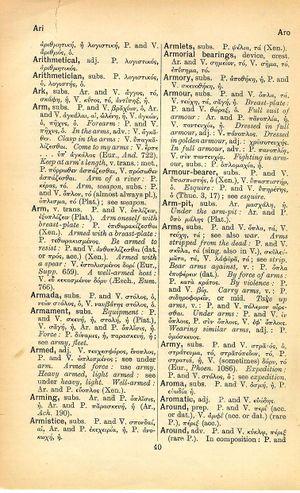aroma
From LSJ
κακοὶ μάρτυρες ἀνθρώποισιν ὀφθαλμοὶ καὶ ὦτα βαρβάρους ψυχὰς ἐχόντων → eyes and ears are poor witnesses for men if their souls do not understand the language (Heraclitus Phil.: Fr. B 107; Testimonia: Fragment 16, line 6)
English > Greek (Woodhouse)
subs.
Latin > English (Lewis & Short)
ărōma: ătis, n. (dat. and
I abl. plur. aromatibus, also aromatis, App. Flor. 4, 19; v. Neue, Formenl. I. p. 291), = ἄρωμα, a spice; in sing., Dig. 39, 4, 16, § 7; Prud. στεφ. 8, 72; id. Apoth. 826; in plur., spices (so only in Vulg.), Col. 12, 20, 2; Vulg. Gen. 37, 25; ib. Exod. 25, 6; ib. Marc. 16, 1; ib. Joan. 19, 40 et saepe.
Latin > French (Gaffiot 2016)
ărōma, ătis, n. (ἄρωμα), aromate : Col. Rust. 12, 20, 2.
dat.-abl. pl. aromatis Col. Rust. 12, 25, 4 ; Apul. M. 3, 17.

